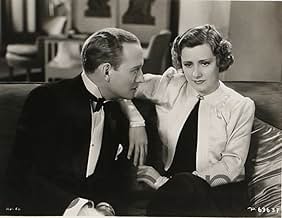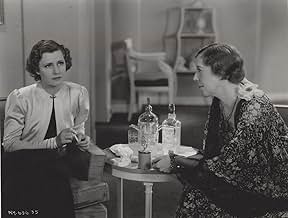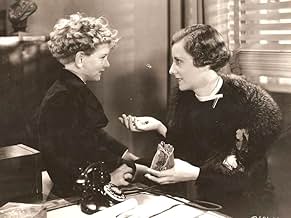A prison reformer and a controversial judge fall in love and have a child out of wedlock.A prison reformer and a controversial judge fall in love and have a child out of wedlock.A prison reformer and a controversial judge fall in love and have a child out of wedlock.
- Awards
- 2 wins total
J. Carrol Naish
- Dr. Sorelle
- (as J. Carroll Naish)
Rafaela Ottiano
- Mrs. Feldermans
- (as Rafaella Ottiano)
Wally Albright
- Mischa Feldermans
- (uncredited)
Margaret Armstrong
- Miss Jones
- (uncredited)
Irving Bacon
- Waiter
- (uncredited)
May Beatty
- Nurse
- (uncredited)
- Director
- Writers
- All cast & crew
- Production, box office & more at IMDbPro
Featured reviews
9cng4
This is what a woman's film ought to be in this era, not just 70 years ago. The Ann Vickers character is a strong woman devoted to her career and to those who depend on her at the women's prison. She is not without her flaws as any hero or protagonist, but she overcomes so many obstacles and definitely has control over her life. What has happened to strong and complex female roles in modern motion pictures? This movie is well acted, well-written and has a tremendous message. I recommend it to anyone who can get their hands on it, as I believe it is still not available on video. It ranks up there with Norma Shearer's character Jerry in "The Divorcee" as far as a well-developed complex strong female characters. We need more movies depicting our gender this way not just as sex objects but as sexual subjects, with career goals and sex drives. Watch this movie!
Ann Vickers (1933)
** (out of 4)
Static version of Sinclair Lewis' play has Irene Dunne in the title role of a social worker who gets dumped by an American soldier (Bruce Cabot) and then puts all her attention on her work. She eventually falls for a controversial judge (Walter Huston) but this here might cost her everything she's worked for. This RKO film was produced by Merian C. Cooper the same year he made King Kong but that's the only thing the two films have in common. Dunne is good in her role but the film is all over the place and it's easy to see that the film is trying to cover several parts of the book but can't take everything in within the short running time. Huston stays under control and gives a winning performance as does Cabot and Conrad Nagel in his supporting role. Edna May Oliver and J. Carrol Naish also have small roles.
** (out of 4)
Static version of Sinclair Lewis' play has Irene Dunne in the title role of a social worker who gets dumped by an American soldier (Bruce Cabot) and then puts all her attention on her work. She eventually falls for a controversial judge (Walter Huston) but this here might cost her everything she's worked for. This RKO film was produced by Merian C. Cooper the same year he made King Kong but that's the only thing the two films have in common. Dunne is good in her role but the film is all over the place and it's easy to see that the film is trying to cover several parts of the book but can't take everything in within the short running time. Huston stays under control and gives a winning performance as does Cabot and Conrad Nagel in his supporting role. Edna May Oliver and J. Carrol Naish also have small roles.
"Ann Vickers" is an adaptation of Sinclair Lewis' book about an unwed social worker who becomes pregnant during World War I and is subsequently abandoned by her lover. It is a valuable social commentary on the mores and folkways of the time (1933) and explores the double standard then existent that condemned a woman for `loose living' while exonerating a man. The most interesting aspect of the film to me was the fact that it was almost a mirror's image of the sea change that took place in morals during 1920's in the aftermath of World War I.
RKO couldn't have picked a better actress to play the part of Ann Vickers. Irene Dunne was young, sensitive, brave, intelligent everything the `modern woman' of the day was supposed to be. Her early professional career was marked by a series of skillfully done tearjerkers of which "Ann Vickers" is one of the better ones.
I highly recommend this movie. Walter Huston did a fine job as Ann's second love, and the man who restored her faith in a loving relationship. It's well directed and filmed and is a wonderful insight into life in the U.S. from just after World War I up until the middle of the Great Depression.
RKO couldn't have picked a better actress to play the part of Ann Vickers. Irene Dunne was young, sensitive, brave, intelligent everything the `modern woman' of the day was supposed to be. Her early professional career was marked by a series of skillfully done tearjerkers of which "Ann Vickers" is one of the better ones.
I highly recommend this movie. Walter Huston did a fine job as Ann's second love, and the man who restored her faith in a loving relationship. It's well directed and filmed and is a wonderful insight into life in the U.S. from just after World War I up until the middle of the Great Depression.
ANN VICKERS is a bizarre tear-jerker from the early days of sound movies featuring IRENE DUNNE as a woman who is well-intentioned but makes all the wrong choices in life, including the men she thinks she loves.
BRUCE CABOT is her first mistake, a man proclaiming great love for her but abandoning her not long after she bears his child. In a weak supporting role, she treats CONRAD NAGEL as a man she cannot love but values as a friend. He's not too happy about that arrangement.
Then comes married man WALTER HUSTON, unhappily married who finds Dunne a refreshing bit of love interest. She has a career that keeps her busy and stands by him when he is accused of mismanaging funds. He's soon imprisoned but she finds a way to get his case some political attention and eventually he is free to marry her.
That's about it, all handled in dreary fashion with hardly a note of music on the soundtrack to lift it out of the doldrums when it gets too soggy to bear. As social commentary on conditions in the 1930s and women's issues, it's a failure. Miss Dunne plays a social worker who rises to play an important role in the penal system for females.
IRENE DUNNE suffers nobly, but it's a weak vehicle for a strong actress and she can do nothing to give the film a sense of real life struggles. Chalk this one up as a failure, even if it was based on a novel penned by no less than Sinclair Lewis. Evidently, not too much has been retained from his novel.
Summing up: Not worth your time. Any film that wastes the talents of EDNA MAY OLIVER as a Duchess has got to make you wonder what they were thinking. It's her dullest role ever.
BRUCE CABOT is her first mistake, a man proclaiming great love for her but abandoning her not long after she bears his child. In a weak supporting role, she treats CONRAD NAGEL as a man she cannot love but values as a friend. He's not too happy about that arrangement.
Then comes married man WALTER HUSTON, unhappily married who finds Dunne a refreshing bit of love interest. She has a career that keeps her busy and stands by him when he is accused of mismanaging funds. He's soon imprisoned but she finds a way to get his case some political attention and eventually he is free to marry her.
That's about it, all handled in dreary fashion with hardly a note of music on the soundtrack to lift it out of the doldrums when it gets too soggy to bear. As social commentary on conditions in the 1930s and women's issues, it's a failure. Miss Dunne plays a social worker who rises to play an important role in the penal system for females.
IRENE DUNNE suffers nobly, but it's a weak vehicle for a strong actress and she can do nothing to give the film a sense of real life struggles. Chalk this one up as a failure, even if it was based on a novel penned by no less than Sinclair Lewis. Evidently, not too much has been retained from his novel.
Summing up: Not worth your time. Any film that wastes the talents of EDNA MAY OLIVER as a Duchess has got to make you wonder what they were thinking. It's her dullest role ever.
Only three years into her Hollywood career (after the initial misstep of "Leathernecking" (1930), Irene Dunne shines in this pre-Code drama. Her portrayal of Sinclair Lewis' "Ann Vickers" is complex, layered and multi-faceted. She is a modern woman and she is determined to change the world as Edna Mae Oliver's character states "if it takes her all winter". But the world almost breaks her. She is impregnated and then emotionally abandoned by Bruce Cabot's cad "Lafe", sent to work in a Purgatory of a women's prison, and finally saved by the love of Walter Huston's Judge Barney Dolphin. In him, she has met her equal--morally, intellectually, and emotionally. Their love is here to stay, as we see when she not only proudly bears their son out of wedlock but stands by him when he is sent to prison on political corruption and graft charges trumped up by his opposition. She too suffers in that she loses a top-tier professional post and must makes ends meet by writing freelance newspaper articles. However, she is undaunted and toughs it out until such time that Barney is paroled and reunited with her and their young son. It is so refreshing to see Dunne in this early role, so far removed from both the screwball comedy and perfect wife and mother roles she would play in the middle and latter phases of her long career. We mourn with her the loss of her first child, the death of whom is ambiguously depicted as coming about by abortion. We rejoice in her finding her soulmate, Barney and cheer them for their unaffected love and affection and the joy they express over their impending parenthood. While this is a "weepie", the Queen of which she would become, Dunne's performance is superior to that of her similar roles of this era. Her talent is just as complex and strong as that of her character and she inhabits the role exquisitely.
Did you know
- TriviaSome objections were made by the Hays Office concerning the plot of the first draft of the screenplay, where Ann marries Captain Resnick and then has an affair with Barney. The plot was changed to Ann being seduced by the Captain with the offense somehow deemed less if only one of the parties in the adulterous affair is married. No reference is made about any abortion in the trip to Havana, and in the released print the cause of death of Ann's baby girl is never mentioned. RKO applied for an "Approved" certificate in 1935, when the production code was more rigorously enforced, but they were informed that no certificate would be given because of the film's attitude towards adultery.
- GoofsAlthough the first part of the picture takes place in 1918, all of Irene Dunne's hairstyles and clothes are strictly in the 1933 mode, and continue as such through the decade of the 1920s which follows.
- Quotes
Barney Dolphin: [last lines]
Matthew Dolphin: Who are you?
Barney Dolphin: Well, son, i refuse to answer without advice of counsel.
- Crazy creditsThe opening credits are printed in the pages of the novel. They are revealed by a man's hand opening the book and turning the pages.
- ConnectionsFeatures Her Man (1930)
- SoundtracksSmiles
(1917) (uncredited)
Music by Lee S. Roberts
Lyrics by J. Will Callahan
Played by a band for dance music at the Lorlears Hook Settlement House
Whistled by Sam Hardy
Danced by Sam Hardy and Helen Cromwell and other couples
Details
- Release date
- Country of origin
- Language
- Also known as
- Sinclair Lewis' Ann Vickers
- Filming locations
- Production company
- See more company credits at IMDbPro
Box office
- Budget
- $303,000 (estimated)
- Runtime1 hour 16 minutes
- Color
- Aspect ratio
- 1.37 : 1
Contribute to this page
Suggest an edit or add missing content


































